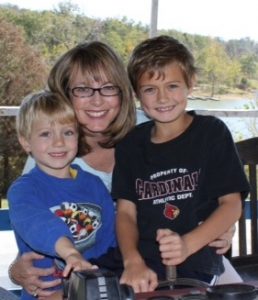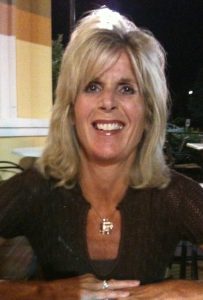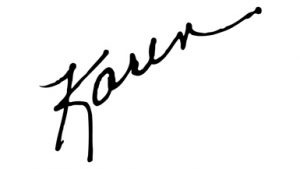This just might be the happiest decade of your life
– but you may appreciate it most down the road…
looking back through the rear-view mirror.
When I look back at my 40s, I realize it’s when I hit my stride in many aspects of my life.
In my work, I was getting better at what I had chosen to do. I had my best sales year ever. I began working as an executive coach.
As a parent, I logged hundreds of hours watching choir recitals, soccer matches, lacrosse games and theater productions. I was president of the PTA.
And I challenged myself by taking up biking and masters swimming. I completed a sprint triathlon.
So with this newsletter, I look forward to sharing a deeper look at a decade that is a turning point in so many lives – our 40s.
This is the third of a series of special columns this year dedicated to exploring Generations at Work: the Decades of our Work Lives – what it’s like to live those decades and how we can work effectively in teams with people in each age group. Never has it been more important to capitalize on the strengths of varied generations at work.
We’d like to hear your reactions and experiences. Whatever your age, please tell us how you see your generation at work – and your advice for forging strong teams of all ages. If you missed the newsletters on work lives in our 20s and 30s, click here to catch up.
And if you are interested in contributing experiences, insights and reactions to our upcoming issues on the 50s and 60s, please let me know.
If you are in your 40s, you may be racing right now to finish a work project, respond to an important email, handle a child’s soccer-uniform crisis or take a moment to hear your spouse’s latest plan for a long weekend.
 Pause and appreciate this:
Pause and appreciate this:
These are great times – maybe even the best decade of your life – according to an ambitious long-term study of Midlife in the United States (or MIDUS) at the University of Wisconsin.
When people 65 and older were asked to pick the age they’d most like to return to, MIDUS researchers have found they didn’t choose the more carefree days of their 20s or 30s. Most often they picked their 40s.
The reason? The 40s are satisfying in ways that matter most, the researchers discovered: feeling in control of your life, having a sense of purpose and having a supportive social network.
“A watershed period” is how New York Times writer Patricia Cohen describes it in her new book “In Our Prime: The Invention of Middle Age” and in her newspaper columns.
While stresses sometimes grow – worries about children, money, aging parents and other responsibilities – so does confidence in our capabilities.

“That sense of control – that you can personally take steps to influence what happens in your life – is both a crucial source of happiness and a catalyst for taking action.”
Where you stand at 40-something: In the middle of the action
With 20 years in the workforce, the 40s are a time for consolidating your position on the job – recognizing the insights you’ve developed about yourself, work and life in general.
Talking with 40-somethings, it’s clear they have confidence about life that’s grown with experience.
- Career arcs start to become clearer. Kirsten Hawley, Director of Organizational & Leadership Development at

Kristen Hawley
Brown-Forman, says: “Looking back, my 20s were defined by seeking identity. My 30s were defined by practicing new skills. I had jobs that helped me figure out what I was good at, and with equal measure, what I wasn’t. My 40s, so far, have been defined by leveraging ability. I am now more clear about where I will excel and where I won’t, what I know and what I don’t, what matters and what I can let go.”

- 40-somethings can’t be neatly categorized. No neat buzzword defines this decade. Cathy Hearld, 49, another leader at Brown-Forman, tells people: “Be aware that people who fall into the ’40-something’ category are very different. They are in an interesting position, as many of them are ‘late Boomers’ and tend to act more as Gen-Xers and the reverse may also be true. Be aware that these people are in a transition period in their lives and may be dealing with multiple issues outside of work – including children and aging parents.”
- The 40s are still dynamic. “A decade of new introspection and great change” is how one 40-something who left a high-level job at a nonprofit organization to start a consulting business at 49 put it. “You’re old enough to know many things and smart enough to begin to understand that ‘knowing’ isn’t necessarily what’s important. I believe people really begin to hunger for purpose and meaning in their 40s.”
 So it’s a good time to take stock: What have you learned? What do you still need to learn? Do you have an entrepreneurial itch you need to scratch? What are the significant experiences you want? International work? A stint in marketing? A sabbatical to write a book? To teach? And how does work relate to your overall values? Harvard Business School’s Clayton Christensen believes we all need strategic plans not just at work – but for our lives. His new book “How Will You Measure Your Life?” – previewed by a Harvard Business review article with the same title – argues that too many people fail to uphold their commitments to family, personal values and work. But success in these areas, he says, will pay off in personal rewards and clarity of purpose.
So it’s a good time to take stock: What have you learned? What do you still need to learn? Do you have an entrepreneurial itch you need to scratch? What are the significant experiences you want? International work? A stint in marketing? A sabbatical to write a book? To teach? And how does work relate to your overall values? Harvard Business School’s Clayton Christensen believes we all need strategic plans not just at work – but for our lives. His new book “How Will You Measure Your Life?” – previewed by a Harvard Business review article with the same title – argues that too many people fail to uphold their commitments to family, personal values and work. But success in these areas, he says, will pay off in personal rewards and clarity of purpose.
- Bottom line: It’s a decade when you can shift gears – or change course. It can be a modest change – taking your existing skill set into a new department or organization. Or it can be dramatic: Eight years ago, in his 40s, Jim Casper left his 20-year career as founder, chairman and CEO of a design firm in northern California to move with his wife to Paris. Today he is creator, publisher and editor of an expanding online platform for contemporary photography called lensculture.com.
Sean O’Leary, 43, left his job as CEO of Genscape, a company he had built, to become CEO of newBrandAnalytics a year ago.
“Leaving the company I founded was both one of the most difficult — yet easy – things I have ever done,” he says. “On one hand, my ‘baby’ was all grown up and needed someone else to lead it to new places. Conversely, I was more than ready for a new challenge.
“Running another company founded by others has presented many new challenges for sure. It’s much easier to start something from a clean slate as opposed to stepping in with pieces already in place.
“I’m glad I’m taking on this new challenge while I’m in my early 40’s. I know so much more about my own strengths and weaknesses that I’m comfortable with the inevitable challenges that arise, and I’ve had enough life experiences that I can avoid many of the landmines that await this new venture…Despite the benefits that a win like Genscape provides, I’m still anxious to work hard and test myself.”
Advice for the 40s: Stay flexible
- Appreciate that work has different “chapters.” Elaine Gravatte uses the metaphor “bandwidth” to describe the energy she can bring to her job as senior vice president of operations at D.D. Williamson, as her children are older. “Work-life continues to be about learning and growing… I am even more intentional about stepping into new situations where I know I will be uncomfortable, just to learn and contribute more to my job and my company. I think my learning rate is accelerating because I have more bandwidth to contribute to work now that my children are in grade school and increasingly independent.”
 Elaine Gravatte
Elaine Gravatte
- You may be offered opportunities that you can’t predict: Go with it. “Life has a way of throwing curves your way,” said a marketing professional who has hit a couple “pivot points” with surprise job propositions in his early 40s. It didn’t take long to say yes. “I thought: I really want to do this…and 10 years from now I might not be offered these kinds of opportunities.”
- Know that you are the architect of your own career. “For me the biggest lesson has been that I’m responsible for any outcome I want from my work life – that it’s entirely within my power to change something I’m unhappy about,” said one 40-something entrepreneur.
- Learn to keep an even-keel perspective. Hawley recalls a boss who became her role model: “He often reminded us to ‘take the work very seriously, but never take yourself too seriously.’ He kept work in perspective – never letting the wins go to his head and also never letting the losses keep him from being upbeat and optimistic. His even-keeled, positive nature was contagious, fostered trust and collaboration, and all of us on the team worked very hard to deliver above-average results. My lesson is to be this kind of leader to my team.”
- Money matters: But how much? As you take stock of where you are and where you want to be, consider a 2010 study by Daniel Kahneman, the Nobel prize-winning economist and author of “Thinking Fast and Slow.” He makes a distinction between life satisfaction and happiness – greater earnings pay off in satisfaction, he found, but our sense of emotional well-being flattens out at an annual income of $75,000.
- Make your time count. The balancing act shifts as your interests and family circumstances evolve. One financial analyst was proud to finish his first triathlon at 40 – and declared it his last. “Too much time away from family.” “I used to say ‘yes’ to everything,” said one 41-year-old with a partner but no children. “I’m learning how to nicely say no.” International entrepreneur Martin Varsavsky wrote in his blog an entry, “On managing my time,” that is a personal confession of what you can choose to give up … to make time for what you care about. Not everyone has his resources, of course. But you learn that he forgoes shopping, passes on alcohol and watches sports once in four years – the soccer World Cup.
- Let reading and travel expand your perspectives. Whether it’s Jonah Lehrer’s new book “Imagine,” Charles Duhigg’s “The Power of Habit,” even poetry like Mary Oliver’s “The Summer Day,” which ends with the line, “Tell me what is it you plan to do with your one wild and precious life?” One 40-something, who reads for escape, says, “Twenty-five years ago, a John D. MacDonald murder mystery suggested that when faced with a moral dilemma, pick the harder choice – it will always be the right one. It’s worked for me every time.”
- Don’t be afraid to play hooky from routine, says one executive. “Taking time to think, read, exercise and find balance helps me get more done, lead more effectively and keep first things first. She also endorses travel: “We try to turn business trips into vacations at every opportunity. My husband and I come back changed and refreshed.”
- If you hit a work plateau, consider a coach. Not a cheerleader – but
someone to give you honest, practical feedback. In “Personal Best: Top athletes and singers have coaches. Should you?” Atul Gawande – a Harvard surgeon and MacArthur “genius” grant award winner – describes his decision to recruit a retired mentor to help him become a better surgeon. He engages his mentor to watch him work and make specific practical suggestions. Gawande proposes many other professions could benefit from similar coaching – and “with the growing pool of retirees, we may already have a ready reserve of accumulated experience and know-how.”
- Finally, take care of your health and your relationships. You can do it at the same time: Run with friends. Cycle with your family. Go to yoga with your sister.

40-somethings offer 10 quick tips for 20- and 30-somethings
We asked a dozen 40-somethings what advice they would give to those a generation younger. Their top 10 suggestions:
- Choose a job “that grows with you” – that offers a continuous challenge.
- Listen more and talk less.
- Stay curious. That trait “separates the wheat from the chaff,” said one manager.
- Be patient. It takes time to really understand all the facets of the business or even a particular field. Give credit to people who have been doing these jobs for a lifetime.
- Stay attuned to your head-versus-your-heart balance. “I have missed some important moments with my family,” said one manager in his late 40s. “I am very conscious of this now and listen more to my heart.”
- Don’t put your personal life on hold. Her biggest regret, said one executive, “Working so many late hours throughout my career…and the stereotype of single-with-no-children put expectations that I could stay all night to get last-minute things done for others.”
- Create a financial safety net for yourself. “Live below your means and save as much as possible,” said a 40-something who worked in outplacement counseling and in a company with layoffs. “Having a job, a paycheck, and benefits are things to never take for granted because they can be fleeting.”
- Be generous at work: “Putting in just a little more, going the extra mile and trying to give back and inspire others seems to pay off big.”
- Keep education in mind. New degrees, new skills, deeper understanding all pay off.
- Find good advisors and mentors – and listen. “My advisors – my father, peers, friends in my industry, my husband. Seeking and heeding advice has saved me from 1,000 mistakes.”
If you work with 40-somethings, here’s what they want you to know
Don’t feel threatened. “My generation is here to work in partnership with you so let’s move forward together rather than competitively.”
Ask for big ideas – then let us help them come alive. “Keep giving us room to develop a vision and make it a reality.”
Be flexible with work schedules. “It’s about the results. Having flexibility when I work and where I work has had an enormous positive impact on my output. I do my most creative work from 5 a.m. to 8 a.m., sitting at my dining room table.”
Be clear about how things are going. “We assume no feedback means everything is great. If not, please tell us.”
Looking ahead…we asked 40-somethings where they see themselves in 10 years.
The variety of responses illustrate our mixed perspectives about mid-life.
- Some 40-somethings see continued steps up a ladder of greater responsibility.
- Others see a version of retirement … consulting … downshifting.
- Some see a deepening role as teachers and guides. “In 10 years, I see myself mentoring young women of color to become community leaders,” said one 40-year-old.
- And yes, there were also some great adventures: “Sailing the world. My husband and I have the big dream of buying a boat and living on it.” First step: sailing lessons.
Next up: The Fifties

Calling you 50-somethings: Let us hear from you – and from the people who work with 50- somethings. If you are in your 50s, what has defined your work life so far? What have you learned? How do you think about your future working life? Have you begun to make plans for the end of one chapter? Where are you headed next? What do you love about this decade? What challenges you? Email me at kw@wunderlin.com.



Leave a Reply